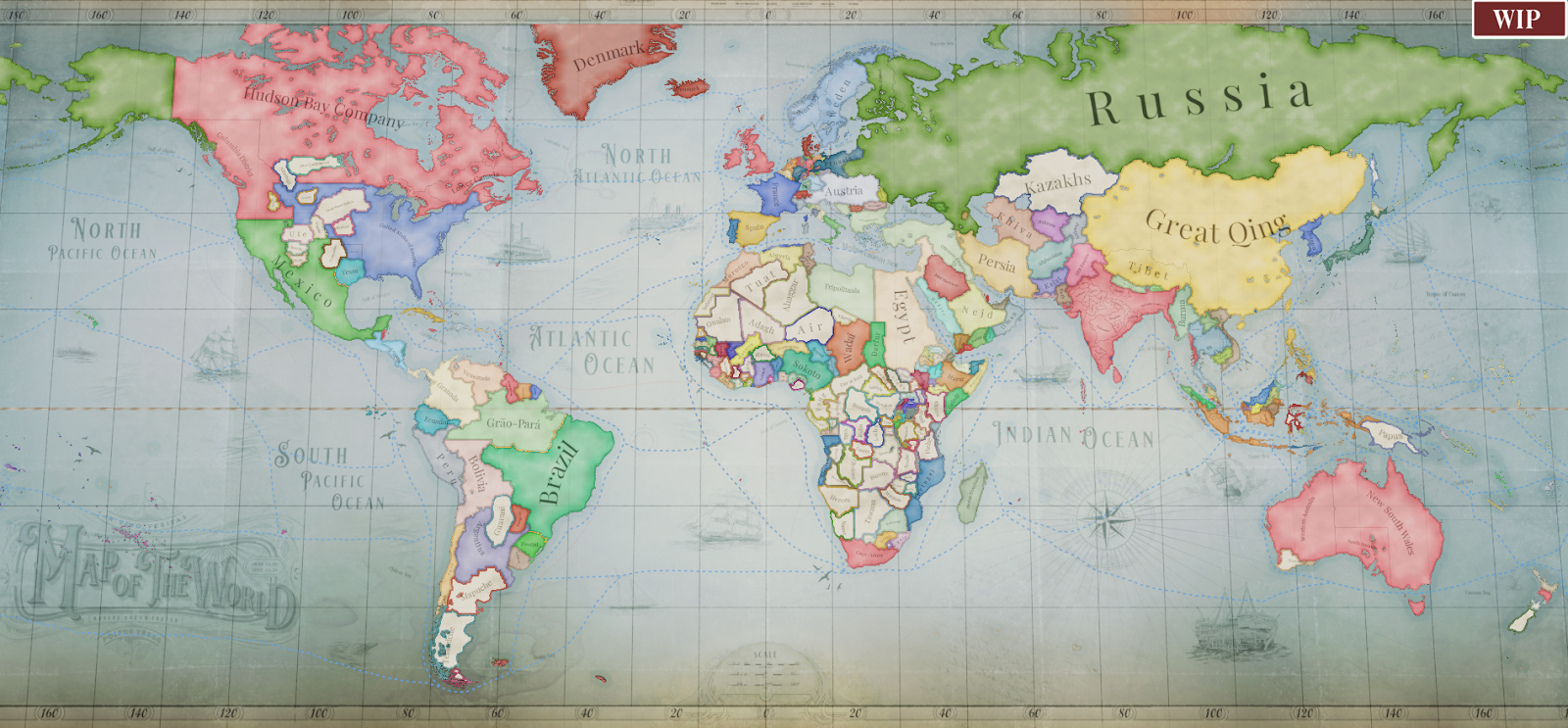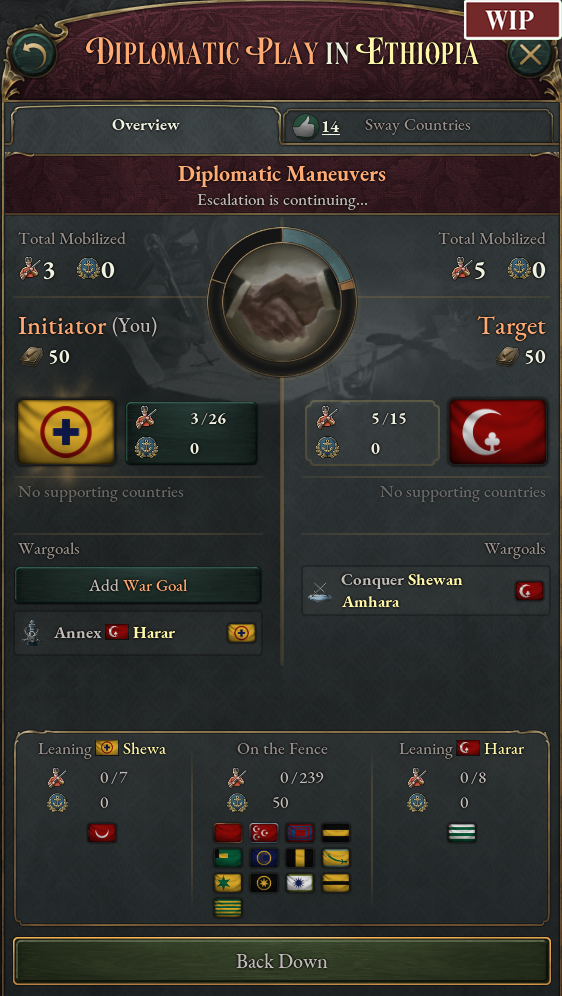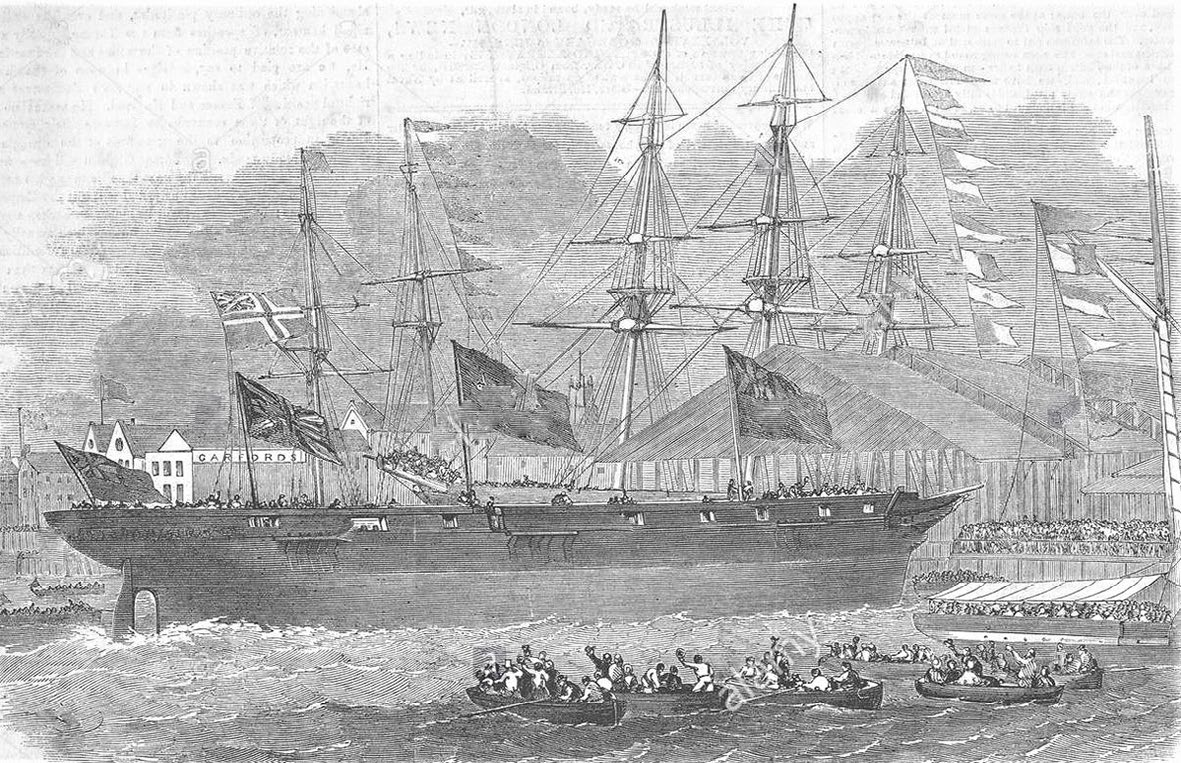
It took us a while, but we built a world!

Let's start with simply: What is Victoria 3? We call it a society builder grand strategy game, where the focus is to mold and shape your chosen country's population, economy, and laws to navigate the power struggles, revolutions, and devastating wars of the 19th and early 20th centuries. In practice this means you will be making many difficult decisions about how to construct your economy, which political factions to empower, and which other countries to befriend and rival.
Everything in Victoria begins and ends with Pops, a.k.a. your population. Pops and their living conditions determine what sorts of economies you are able to run. An agrarian economy may be great at feeding itself and could sustain itself for a long time, but lacks access to manufactured goods to increase living standards. Manufacturing-based industry is more centralized, creating urban centers with wider wealth gaps, but the resulting increase in domestic demand can provide a stable economic foundation for your market. Laissez-faire could make sense for countries whose population demands a wide variety of products while specializing in highly effective production of specific goods, while a command economy may be desirable to counteract foreign influence and steer your population with more precision.
Your people, the bedrock of the simulation and the enduring feature of Victoria games.

Your economy is based around a web of industries (a.k.a. "buildings") that produce and/or consume goods, and the consumption demands of the Pops themselves. Buildings do nothing on their own but must be staffed by Pops, who in return are (hopefully!) provided with wages sufficient to purchase goods and services to improve their living conditions. Privately owned buildings have owner Pops who collect the profits, which they may reinvest or conspicuously spend on lavish luxuries, driving up demand for exotic imports like Fruit or new inventions like Automobiles. As the spirit of your nation, you decide which buildings to construct, where they should be situated, and whether they should be state-subsidized or not. Each such decision will have long-term implications for your country's future.
Buildings are your main tool for nation building, as you determine what your population should be occupying their time with and how. During development, more and more gameplay features were implemented using buildings and their production methods.

Pops are "real people", they don't suddenly appear just because there's work to be done. This begs the question, what would Pops be doing before suitable workplaces have been constructed for them? In Victoria 2, Pops not employed in factories or in special roles like Capitalists contributed towards "Resource Gathering Operations" (RGOs) which created all raw resources in the game. In V3, we wanted resource industries to be among the viable, active choices you could focus your efforts on, but we also didn't want the majority of the population to work on high-yield modern farms at game start. The solution we came up with was subsistence farming, where all unused arable land in a state could be used by Pops of the Peasant Profession to sustain themselves and produce a very small amount of excess goods for the market. These subsistence farms will gradually disappear as modern, industrialized farms and organized plantations are constructed in their place. As there is no guarantee that proper resource industries will pay lower-class Pops a better wage than the living standard Peasants could achieve by simply working the land, depending on when and how this transition is done it may lead to increased wealth disparity even while it's certainly better for your market economy.
Each Pop has an amount of Political Strength derived primarily from their size and wealth, modified by the country's laws. This influence is distributed across the various Interest Groups the Pop supports, empowering them to steer the country's political direction. For example, a wealthy plantation-owning Aristocrat might put most of their gravitas behind the Landowners, espousing a kind of patronizing conservatism. A nation of Farmers might champion the Rural Folk and their simple, honest, and non-expansionist way of life. Meanwhile, a group of coal mining Machinists might join the Trade Unions to push for both workplace safety regulations and more egalitarian expansion of the voting franchise. Over time you will start to recognize the patterns in how your economy has developed over the decades, and how this results in altered power distributions and the emergence of different political movements demanding change.
Interest Groups are new to Victoria 3 and act as the people's voice in their interactions with you. Just like everything else in the game they ultimately only function due to the Pops that lend them support, so impacting the Pops directly will also affect the Interest Groups.

In the earliest playable iteration of Victoria 3, Interest Groups were very dynamic and always organized into parties or factions. Interest Groups could suddenly appear in a country or change their beliefs based on triggered conditions. They had opinions on everything from reforms to what buildings should be constructed to which wars should be waged. This turned out to be extremely confusing, as players never really got a handle on what their country was all about or the outside limits of what might happen if they performed an action. To combat this we created eight Interest Group "templates" which were the same for all countries, with individual variations on those templates for different countries. Rather than popping into existence or fading away as there were causes to champion, we split off a new type of organization - Political Movements - from Interest Groups, so the latter would always have their own identity and ideology while the former could be used to push issues. Rather than changing Interest Groups' opinions based on triggered conditions, we introduced Interest Group Leaders which could modify an Interest Group's ideologies. Finally, we removed the Party/Faction layer altogether, only to reintroduce Parties much later in development as a more comprehensible political layer active only in democracies that still puts Interest Groups front and center.
The set of laws available for a player to try to change has evolved during development, with different tax laws merging into a single category, trade policy being split from the economic system, and the various army model laws being introduced.

The laws themselves, and the institutions they sometimes enable, tie back into the economy through the Pops. Changes to your taxation system might require you to course-correct your economy to both keep your people fed and your treasury in the black. Different army models might permit you to maintain a well-trained, professional army, or require you to rely on raising part of your population as conscripts during times of war which could disrupt your industry. Universal pensions will raise your overall standard of living and decrease poverty rates and turmoil, but can be costly to maintain. And without an education system, you will have a hard time developing the qualifications your Pops need to take advanced professions in cutting-edge factories, academic, and financial institutions.
Our initial model for how Interest Groups should support one Laws over another was based on a kind of 3D political compass, or maybe something akin to Stellaris' Ethics system. But it did not take long for us to realize just how inadequate this method was for describing all the different political positions people in the 19th century could take. For example, is "colonization" a progressive or conservative policy? The answer is that it entirely depends on the context, culture, and whatever intellectual arguments had been voiced by one philosopher or another within the prior decade. So rather than trying to create a brand new theory of Political Science, we abandoned this matrix-model for a much more bespoke system of many dozens of ideologies that each have their own set of stances on specific laws.
An enduring question during early development was, how much should government employees be paid? A fixed amount seemed particularly wrong, but so did a fully configurable amount. We settled on a continually updating national Normal Wage value - a weighted average of wages paid by private industry across incorporated states - and letting the player set wages in steps around this norm, with bonuses or penalties applying for paying more or less.

If you want to run a competitive nation, you cannot rely exclusively on private industry - the bureaucratic machine has to function, taxes must be collected, trains and ships have to depart on time, and the army and navy has to be fully staffed and on alert. These government functions are also represented via buildings, with the Pops who work there paid directly by the treasury. Every individual in your country is represented by Pops, who perform all the functions that make your nation what it is.
Originally Institutions was just another type of Law that you could invest Bureaucracy into. Splitting them out into their own entities whose nature can be changed by Laws made them come alive in a totally new way, and lets you more clearly see how your country's becoming more capable and complex over time.

One design challenge we had to tackle early on in development was how we would represent institutions: as concrete buildings on a local level, or more abstractly on a national level? We really wanted Pops to be responsible for staffing the public sector, so as to not pretend that things like healthcare, education, and policing just happen from legislating their existence. But on the other hand we didn't want to have to saddle the player with having to micromanage constructing the exact right number of hospitals, jailhouses, employment offices, tax collectors, etc etc in every state. In a fit of insanity we briefly flirted with the idea of non-local buildings, where Pops would live in one place but work in an indeterminate "cloud-based" workplace that provides benefits to the entire population, but this started looking like the kind of weird hacky solution that would come back to haunt us later in development and we thankfully abandoned it quite quickly. After consulting a programmer with much fresher eyes on this issue than the design team at this point, we decided to make a building that creates a currency (Bureaucracy) that institutions would consume, just to see how that felt. This proved an excellent trade-off, letting players customize which parts of their country their administration was centered in while ensuring that legislated promises of access to services were distributed correctly across the country in different proportions without excessive micromanagement.
With a well-oiled market supported by appropriate laws you can turn your eye to the economies abroad. Not all goods your people demand can be acquired locally, so which countries do you want to trade with? Importing another country's products could be exactly the kickstart your economy needs, but will also enrich the exporting nation and make you dependent on their economy. Exporting consumer goods will benefit those of your Pops who own the factories the most, while it will come to the detriment of Pops consuming those goods. Each decision made will impact different segments of your population, both economically and politically.
In the original trade system, the amount of goods your routes moved was quite open-ended and required trade center management on both ends. It was micromanagement heavy, complex to understand, and easy for both player and AI to abuse.

Trade has gone through a number of iterations, as it works very differently from both Victoria 2 and most other strategy games. We knew very early on that we wanted market-to-market trade of specific goods, and our supply-and-demand system works well out of the box for creating incentives to trade. The first trade system was serviceable - you would earn trade routes from building Trade Centers and would spend them to move a certain number of goods between two markets. It made sense and was simple to understand, but turned out quite micro-intensive as you had to babysit routes to move just the right amount. It was also much too easy to destroy foreign economies by simply stealing all their supply of a crucial good or oversaturating a market, which was nominally fun to do to the AI but less fun when the AI did it to you.
In the new system, only the country establishing the route gets a trade center to manage it, and the quantity of goods is dependent on what is actually profitable to trade. You can still fine-tune who your trading partners are and how large the routes can grow by using tariffs and embargoes, but the level of interactivity is much more even.

The trade system currently in the game instead creates and expands Trade Centers to manage trade as needed, earning money for the Pops who work it based on the marginal price difference between the two markets. This way you simply establish a route between two markets, and if that good is in high demand in one and in high supply in the other, it will grow until there's no money in trading a larger quantity. That also meant we could implement a tariff system where a player can both earn money off trade and deter other players (or the AI) from importing or exporting particular goods. Crucially though, we needed to see the first, simpler system in action before figuring out what the problems with it would be.
Your nation's prestigiousness, determined by the size and power of its economy, military, culture, and other aspects, sets its position on the global power ranking ladder. Are you but a Minor Power, barely involved in local affairs involving your neighbors? Or a Major Power, a regional powerhouse or up-and-coming global player? Or one of the few Great Powers, whose tendrils reach all over the world, constantly trying to one-up each other so none get too far ahead?
This ranking sets the amount of Influence you receive, which can be used to establish and maintain Diplomatic Pacts with other nations. Trade Agreements simplify trade between your countries, Alliances permit you to come to one another's aid, Customs Unions merge several markets, and numerous types of Subject relationships can be either demanded or requested - by either party, since enjoying the protection of a Great Power may be worth the loss of freedom it entails. Pacts can only be established if countries have overlapping strategic interests, a limited resource forcing you to pick and choose between the parts of the world that matters to you. Interests have always been core to the design principles of Victoria 3 but have gone through a number of revisions as well, some of which will be covered by Martin next week!
Rather than fabricating claims or war justifications, in Victoria 3 you can be as bold and brash with your demands as you wish - for as long as you can afford the Infamy and don't endanger the wrong Great Powers. Finding a balance between the ability to strategically pre-plan your Plays and still having to navigate uncertain outcomes is key to making Diplomatic Plays feel satisfying, and a lot of iteration on both mechanics and AI has gone into finding it.

Demands between nations can also be asserted as Diplomatic Plays, where every country with a stated interest in a region may weigh in on the issue by supporting one of the sides. With enough military strength supporting your claims, even a territorial dispute may be resolved without a single shot being fired. But this is much less a negotiation and more a game of chicken, where in a best-case scenario at most one side walks away with what they want. If that would be you, are you prepared to press this issue even to the point of war, knowing the tremendous loss of money and lives that would bring? Or should you make a concession now and start planning your revenge?
Diplomatic Plays is in many ways an evolution of the Crisis system from Victoria 2: Heart of Darkness, where a "flashpoint" somewhere on the globe could spark an international crisis involving several Great Powers picking sides. The mechanic works well to emphasize the importance of international "policing" of world conflict in the era. Instead of it arising from a flashpoint, issuing a Diplomatic Play in Victoria 3 causes an incident which adversely affects the country initiating it. It can also involve a lot more countries than just Great Powers, as regional or local players might also become involved or recruited.
The point of going to war is to press your war goals and sign a peace deal as soon as possible. Nothing is worse for the economy than a forever-war (unless the foundation of your economy is arms manufacturing, that is…)

Should war become inevitable, you have many further choices to make. What proportion of your population do you conscript into service, and which parts of the country do you leave to keep the economy running? Which of your generals do you mobilize, and which do you retain in reserve? Which troops do you send where? Do you keep your navy back to defend your shorelines, send them out to protect your trade routes, or try to sabotage enemy trade and supply lines? As generals and admirals have different ranks, skill traits, and force allocations from supporting barracks and naval bases, which resource you utilize where can make a big difference in the outcome of the war. Since generals and admirals also support their own Interest Groups, their performance against the enemy can also cause political shifts that persist even after the war.
After having allocated your resources and issued orders, your generals and admirals perform their duties to their best abilities, letting you focus on managing the home front - expanding or subsidizing industries necessary for the war effort, establishing trade routes, managing your taxes, and dealing with dissidents and radicals that use the chaos of war to further their own causes. The outcome of the war is to a large extent determined by if you can keep your population's spirits high - even if your frontlines are gaining ground, it won't help a people demoralized from lack of bread (or furniture, or coffee, or…). Such a population may insist you sign a peace deal as quickly and favorably as possible, whatever your long-term plans were.
As you might imagine, the warfare mechanics have gone through extensive iteration to hit the design goals. Moving stacks of variable-sized armies between small provinces and having fights break out when they overlap is a tried and true mechanic that works great in many strategy games, not just Paradox GSGs. But for Victoria 3 it didn't feel right - the pacing felt off compared to the management/society building gameplay, handling multiple simultaneous wars (or multiple fronts) as a global Great Power was a pain, and the element of "tactics cheese" where a human could use trickery to devastate an AI with a superior army actively harmed the dynamics of Diplomatic Plays where armies are measured against each other by statistics.
Of course, new systems come with new sets of challenges. If you are forced to manage 20 generals and their orders, it's no less work than managing 5 stacks and their locations. Giving the player a sense of presence and an overview of their forces when you can't give a precise location for an army or fleet is a challenge, especially when they're moving to or from something. And most of all, even though we want to reward foresight and strategic thinking, having the outcome of a war virtually predetermined the moment someone starts a Play against you is no fun at all. We're happy with the way it works now, but it has required a lot of experimentation, testing, compromises, and particularly UX work and visual polish.
The true enemy of Victoria 3 is often found inside your borders.

Fail to keep your population content and you may have a revolution or even a cultural secession on your hands. As a populace grows more literate they become class-conscious and politically active, starting or supporting movements to change the nation's laws or demand autonomy. Such situations can be dealt with in several different ways, ranging from the classic bread-and-circus approach of ensuring everyone is so materially satisfied they have no reason to complain, through granting other popular concessions such as welfare programs or a somewhat expanded voting franchise, to suppressing the rowdy Interest Groups and cracking down on protesters with a national guard or secret police. Managing such uprisings before they break out is important even if you have a strong military, since other countries may take advantage of your internal strife and support the revolutionaries in exchange for making you a future puppet state.
One system we thought we'd knocked out of the park on the first attempt was the algorithm for determining which states would rise up against you in case of a revolution. The number would be largely based on the total Political Strength share of the revolting Interest Groups, so if 25% of the Political Strength was against you and your country had eight states, two of them would revolt. Furthermore they would tend to revolt in a cluster, so you wouldn't be fighting on a number of fronts against individual states but as a unified force. The state with the highest proportion of revolutionary Political Strength would be selected as the epicenter, with states neighboring the epicenter likely to follow them.
That worked quite well for large, terrestrial countries like for example France, USA, Brazil, and Russia. But for some reason, every progressive reform in Sweden would result in Gotland - a small sheep-farming island between Sweden and the Baltic states - rising up in lone protest. Can you guess why? The very small population of Gotland consists of only politically apathetic Peasants, and those few Aristocrats who own the land. Therefore, the conservative Landowners held the most dominant position there - relatively speaking - by far. And, in order to be guaranteed more than 1 rebellious state out of Sweden's 5, the Landowners would need to hold 40%+ of the Political Strength. The current algorithm is substantially less elegant but a lot more nuanced, producing results that don't require launching naval invasions against angry shepherds with every social reform you make!
This is of course just scratching the surface of all the systems and dynamics that emerge within Victoria 3's simulation of the modern era. I didn't even get into technology, colonization, infrastructure, slavery, literacy and qualifications, enactment of laws, population growth and migration, national unifications, and all the journal entries and events that shake the game up and keep it eventful throughout the century-long campaign. You can look back at previous dev diaries to get more details on all of these, or wait a mere 8 weeks to see for yourself!
As mentioned, next week Martin will return to discuss the revisions we have made to the Interests mechanics. Tomorrow the team will head out to PDXCON to see several hundreds of you play the game for the very first time, help moderate a massive Victoria megagame, and run panels about the game and its development. We'll be back to continue polishing the brass and tweaking the knobs on Monday, getting everything just right for when you get your hands on the game on October 25th!
Victoria 3 is now available for pre-order! https://pdxint.at/3KlLWgf











